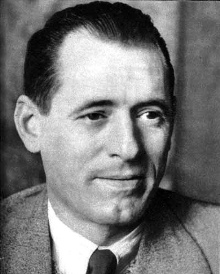Vicente Uribe facts for kids
Quick facts for kids
Vicente Uribe Galdeano
|
|
|---|---|
 |
|
| Minister of Agriculture | |
| In office 4 September 1936 – 31 March 1939 |
|
| Preceded by | Mariano Ruiz-Funes |
| Succeeded by | Raimundo Fernández-Cuesta |
| Personal details | |
| Born |
Vicente Uribe Galdeano
30 December 1902 Bilbao, Spain |
| Died | 11 July 1961 (aged 58) Prague, Czechoslovakia |
| Political party | Communist Party of Spain |
| Occupation | Metalworker, politician |
Vicente Uribe Galdeano (born December 30, 1902 – died July 11, 1961) was a Spanish metalworker and a key politician. He was a leader in the Communist Party of Spain (PCE). During the Spanish Civil War (1936–1939), he served as the Minister of Agriculture for the side fighting against Franco. After the war, he lived in other countries like Mexico, France, and Czechoslovakia.
Contents
Life and Political Journey
Early Days and Joining the Party
Vicente Uribe Galdeano was born in Bilbao, Spain, in 1902. He worked as a metalworker. In 1923, he joined the Communist Party of Spain. By 1927, he became a member of the party's main leadership team.
He married Teresa García, and they had five children. In 1932, the Spanish Communist Party changed its main goal. They decided to focus on "Defense of the Republic" instead of an older slogan. Uribe was one of the new leaders who helped guide the party. He also helped write the plans for the Popular Front group for the elections in February 1936.
Role During the Spanish Civil War
The Spanish Civil War began in July 1936. On September 5, 1936, Uribe was chosen to be the Minister of Agriculture. He joined the government led by Francisco Largo Caballero.
The Communist Party wanted to support small business owners and farmers. In September 1936, Uribe spoke about protecting farmers. He said that violence against farmers was dangerous. He urged farmers to keep working their land. He promised them protection from the government and the Communist Party.
On October 7, 1936, Uribe made an important rule. It took over all rural land from people who had joined the military uprising. This land was then given to groups of farmers and farm workers. They could choose to work the land together or individually. Small farmers who rented land were given the right to use their land forever. This rule was seen as a big step, breaking the power of large landowners.
However, some groups, like the anarchist CNT, did not like this rule. They were against protecting the rights of small landowners. Throughout the war, Uribe did not give a permanent legal status to the farm collectives. By spring 1937, the Communist Party started supporting the return of some land. This land went back to landowners who did not support Franco, and to tenant farmers.
In November 1936, a special War Council was set up. Uribe was part of this council. Later, in May 1937, Uribe and another communist minister caused the government to change. They disagreed about violence in Barcelona. They wanted a group called POUM to be banned. When the leader, Largo Caballero, refused, many ministers left the meeting.
On May 17, 1937, Manuel Azaña appointed Juan Negrín as the new Prime Minister. Uribe continued as Minister of Agriculture in Negrín's new government. He was the only communist minister in the second Negrín government, formed in April 1938. Uribe remained Minister of Agriculture until February 1, 1939.
Life After the War
After the Republic lost the war, Uribe left Spain. By late 1939, he was in Mexico. He became a leader for the Communist Party group there during World War II (1939–1945). He was second in command of the party after another leader was removed in 1944.
In May 1946, Uribe moved from Mexico to Paris, France. Later, in 1950, Spanish communists were banned in France. Uribe then moved to Prague, Czechoslovakia.
After Joseph Stalin died in 1953, Uribe, along with Dolores Ibárruri and Santiago Carrillo, became the main leaders of the Communist Party of Spain. However, Carrillo started to seek more power.
In 1956, after Nikita Khrushchev criticized Stalin, Uribe faced problems. He was accused of having a "cult of personality," meaning he was seen as too powerful or important. As a result, he was removed from the party's leadership in July–August 1956.
Vicente Uribe passed away in Prague on July 11, 1961.
Images for kids
See also
 In Spanish: Vicente Uribe para niños
In Spanish: Vicente Uribe para niños
 | Chris Smalls |
 | Fred Hampton |
 | Ralph Abernathy |


